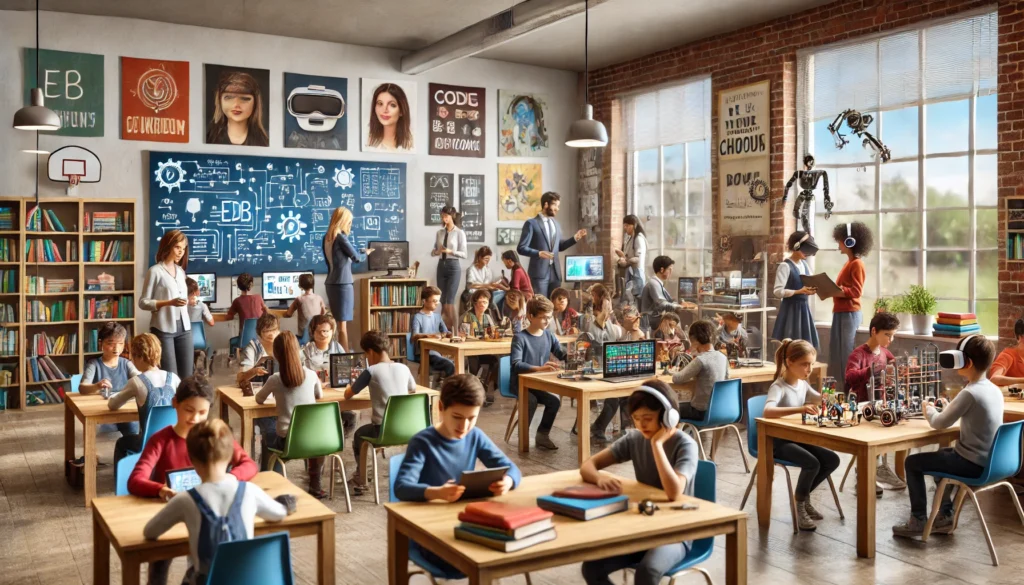Education was meant to foster progress but when turned it into a trap, affect both personal and social growth.
Education has always been hailed as the great equalizer, a transformative force that bridges the gap between social classes, uplifts the middle class, and fosters a stable, cohesive society. Historically, access to education has been the key to economic mobility, enabling individuals from lower socioeconomic backgrounds to rise above poverty and achieve a higher social and economic status. However, today’s education system is increasingly compromised by commercialization, rising costs, and an erosion of its original purpose. As education becomes more financialized, the promise of upward mobility it once held is slipping further out of reach, threatening not only the stability of the middle class but the very foundation of a fair and cohesive society.

During the Industrial Revolution, public schooling systems emerged as a means for working-class children to escape poverty and access opportunities previously reserved for the wealthy. This widespread access to education played a key role in creating a more egalitarian society, reducing tensions between social classes, and contributing to the stability and cohesion of nations.
The Role of Education in Fostering Social Stability
Education’s ability to foster social stability cannot be overstated. Societies that provide universal access to education tend to be more cohesive, as education cultivates shared values, knowledge, and civic responsibility. When education is available to all, it promotes equality of opportunity, reducing the social divides that can lead to unrest or instability. Historically, the middle class—nurtured by access to education—has formed the backbone of social cohesion in many societies, providing the labor force, leadership, and cultural stability necessary for long-term prosperity.
In a healthy society, education functions not just as a means to secure financial success, but as a tool for intellectual, moral, and civic development. It prepares individuals to engage meaningfully in democratic processes, understand complex societal issues, and contribute thoughtfully to the collective wellbeing. The expansion of educational opportunities has often been linked to the growth of a robust middle class and the mitigation of class-based tensions. However, when education becomes increasingly commodified and inaccessible, it not only harms individual opportunity but also undermines the social stability it once helped to maintain.
The rising costs of education have become a significant barrier to upward mobility for the middle class. Once a powerful tool for lifting individuals into the middle class, education is increasingly out of reach for many due to skyrocketing tuition fees and the growing burden of student debt. Public universities—historically the cornerstone of accessible education—are becoming privatized and prohibitively expensive, leaving many students with no choice but to rely on expensive private institutions or incur crippling debt.
The emphasis on education as an economic investment—measured solely by return on investment (ROI) in terms of future earnings—has fundamentally altered the purpose of education. The focus has shifted from intellectual growth, personal empowerment, and civic engagement to job readiness and financial success. This narrow view of education not only diminishes its value as a tool for holistic development but also limits opportunities for those who cannot afford the rising costs, leaving them trapped in a cycle of debt without the social and financial benefits education once promised.
As education becomes more financialized, the middle class finds itself increasingly burdened by its costs. The dream of sending children to college, once a symbol of progress, has become financially unsustainable for many families. The commercialization of education, paired with rising student debt, is not just eroding individual opportunities—it is eroding the very fabric of the middle class and, by extension, the stability of society.
In addition to the financial strain of modern education, the cultural shifts driven by social media and television are contributing to a new set of challenges for the younger generation. In countries like India, the rise of social media platforms such as Instagram, TikTok, and YouTube, along with sensationalist TV shows, has created a cultural environment where superficial values are prioritized over intellectual and moral development. These platforms often promote an idealized vision of success, one that is measured by appearance, wealth, and fame rather than knowledge, character, or personal growth.
The pervasive culture of comparison on social media leads to increased pressure on young people to conform to unattainable standards, often at the cost of their mental health and well-being. Studies have shown that constant exposure to these curated lifestyles can lead to anxiety, depression, and a distorted sense of self-worth. Television shows that glorify materialism, fame, and scandal further exacerbate this problem, creating unrealistic expectations for success and undermining the importance of intellectual development.
The influence of social media and entertainment has changed how young people perceive education. The focus has shifted from learning for personal growth and civic contribution to viewing education as merely a stepping stone to financial success and social validation. This shift in perspective not only harms students’ mental health but also undermines the deeper, philosophical purpose of education as a tool for personal and societal development.
The Philosophical Foundations of Education: Plato, Kautilya, and the Dialectical System
Western and Indian philosophical traditions have long emphasized the importance of a dialectical system of education—a process of inquiry and critical thinking that encourages individuals to question, explore, and deepen their understanding. Plato, in his Republic, envisioned education as the means to cultivate the virtues of wisdom, courage, and justice. In Plato’s ideal society, education was not just about preparing individuals for work, but about shaping morally upright citizens who could lead with wisdom and justice. Plato argued that the state should oversee education to ensure that it serves the common good, creating philosopher-kings who could rule wisely based on their deep understanding of truth and morality.
Similarly, the ancient Indian philosopher Kautilya, in his Arthashastra, emphasized the need for a well-structured, state-sponsored education system that balanced practical skills with intellectual and moral development. Kautilya believed that education should prepare individuals not only for economic success but for responsible leadership and ethical governance. His vision of education as a public good aimed to cultivate a disciplined, knowledgeable citizenry capable of sustaining the welfare of the state.
Both Plato and Kautilya recognized that education is a foundational element of a stable, just society. In their views, education was a tool not just for personal advancement but for the collective good. They argued that the state has a responsibility to ensure that education serves the broader societal interest—fostering intellectual growth, ethical behavior, and active participation in democratic life.
To restore education’s role as a bridge between social classes and a tool for social mobility, we must rethink the current system. Education should once again be seen as a tool for personal empowerment, intellectual development, and social stability—rather than just a means to economic ends. Governments must prioritize accessible, affordable public education and reform student loan systems to reduce the financial burden on families.
Furthermore, we must shift the focus of education away from narrow, job-specific skills and return to a more holistic model that emphasizes critical thinking, creativity, and ethical development. Education should prepare individuals not just for employment, but for thoughtful, active participation in society. This involves reimagining the role of media and entertainment as well, promoting narratives that emphasize intellectual growth, moral integrity, and civic responsibility over superficial success.

